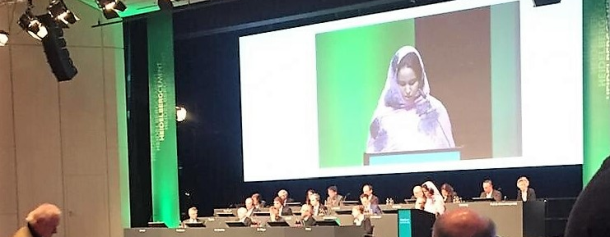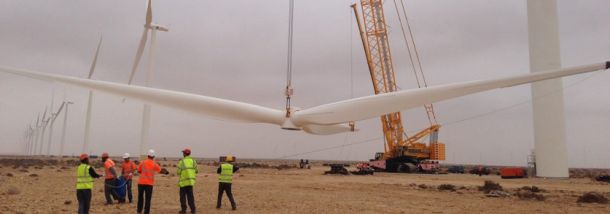
Last week, the German multinational acquired another cement factory in occupied Western Sahara.
Photo above: HeidelbergCement already controlled one cement factory in Western Sahara, the CIMAR unit outside of El Aaiun, seen in the picture. Now, they own a second factory nearby.
The Moroccan cement company Cimenteries Marocaines du Sud (CIMSUD), operating a cement production unit near El Aaiún in occupied Western Sahara, has now been taken over by the German company HeidelbergCement.
This is clear from a press release issued on 4 May 2020 by Ciments du Maroc [or download]. The press release explains that the acquisition was finalised on 4 May 2020, following an agreement signed with the previous owner Anouar Invest on 26 July 2019.
The buyer, Ciments du Maroc, is 51% controlled by the German multinational cement group HeidelbergCement.
The cement industry is fundamentally important for the Moroccan occupation of the territory, including settlement policy and key industries that are being developed in violation of international law.
Moroccan media wrote in 2016 that the Anouar group's decision to construct the CIMSUD factory was "in order to support the development of the southern regions in the wake of the many infrastructure investment projects (OCP complex, port, technopole, roads, etc.) and housing projects planned in the southern provinces. The new unit will thus make it possible to meet the growing demand for cement in the region". [or download]
The research division of the German Bundestag just last year published a report on the legal consequences of Morocco's settlement policy in Western Sahara, a territory it has illegally occupied since 1975. Through its production of cement, HeidelbergCement is a key partner of Morocco's illegal annexation and settlement practices as described in the report of the Bundestag division.
From what Western Sahara Resource Watch (WSRW) understands based on media reports, the construction of the CIMSUD factory has met with several delays. CIMSUD "is experiencing delays in construction", Jeune Afrique reported on 30 July 2019 [or download]. "Commissioning was scheduled for July 2017, according to the group's communication. According to our information, it should not be delayed any longer", Jeune Afrique described.
As late as 4 May 2020, the same day as the completion of the HeidelbergCement takeover, Moroccan media reports were not clear as to whether the factory is finished or not. Challenge.ma told that the previous owner Anouar Invest had still not completed the two large investments it had set out some years before - one of which was the CIMSUD.
The CIMSUD factory is thus the second unit that the German group controls on occupied land. Through Ciments du Maroc, HeidelbergCement already owned the CIMAR cement unit on the outskirts of El Aaiun city.
WSRW has on several occasions contacted HeidelbergCement regarding the CIMAR operation, but has never received an answer. The issue of HeidelbergCement's operations on occupied land was addressed at the company’s AGM in 2019 by a Saharawi refugee in the name of the sahrawi youth and of the German NGO 'Kritische Aktionärinnen und Aktionäre'. Instead of answering the question, the company explained that it supports local sports clubs.
The company consistently presents Western Sahara as part of Morocco, in contrast to the United Nations and international courts.
The CIMSUD factory itself was constructed by another German company, ThyssenKrupp, according to a press release of 17 February 2016 [or download]. Here is another undated release from Anouar's initial construction of the factory [or download].
'We deserve an answer' from HeidelbergCement
When requesting answers on human rights from HeidelbergCement with regard to its operations in occupied Western Sahara, Saharawi Khadja Bedati was told that the company "deliberately makes social sponsoring of various sports clubs".
UK company building wind park in occupied Western Sahara
Morocco and Siemens press on with their plans to generate energy in the human rights black-spot that is Western Sahara: the first controversial wind farm near Boujdour is expected to be operational in December 2018, built by a UK company.
New controversial energy infrastructure to be built in Western Sahara
The Moroccan government has opened for a relatively large tender in Dakhla.
Report: Moroccan green energy used for plunder
At COP22, beware of what you read about Morocco’s renewable energy efforts. An increasing part of the projects take place in the occupied territory of Western Sahara and is used for mineral plunder, new WSRW report documents.



